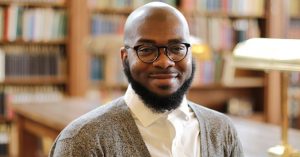Congratulations to ECL Ph.D. candidate Don Holmes! Holmes has been selected as one of UNC’s four institutional nominees for the ACLS Emerging Voices Fellowship.
After being selected from departmental nominations across the college, Holmes will now go through the selection round at the American Council of Learned Societies.
Read more about Holmes’ far-reaching project and his further plans for the research:
“My research interests are in early African American rhetoric, literacy, and language. I investigate the narratives of my early ancestors to illuminate the methods they used to negotiate their voices into public discourse through a centering of a Black worldview. My current project, ‘Black Diplomatic Rhetoric,’ outlines what I describe as a ‘diplomatic rhetoric’ that black speakers/writers used to expose the dominant society’s anti-black sentiments about Black material and spiritual exclusion in early America. I describe my work as seeking to understand the diachronic evolution of early African American rhetoric, tracing rhetorical shifts from negotiating directly to influential white audiences to speaking to and for a robust and growing consequential Black and public demographic at the turn of the nineteenth century. Even though my work is grounded in rhetorical theory and early African American cultural history, I find it especially important for understanding the United States’ contemporary ills, such as police brutality and voter suppression, among others. The lasting moan of #blacklivesmatter, for instance, has permeated within every African American generation, continuing calls for a more equitable and just society. In other words, the social justice engagement of the twenty-first century isn’t new but part of a long narrative in which African Americans have had to constantly argue for their humanity.
While I am still researching and writing more and more on my current project, I envision it as a public-facing book project that could aid in amplifying our understanding of the early Black experience in colonial America. My work seeks to center Black voices during this timeframe, and I see my work as having lasting contributions not only to African American rhetoric studies, but indeed the ways in which we view early American history, its promises, and its failures.”


